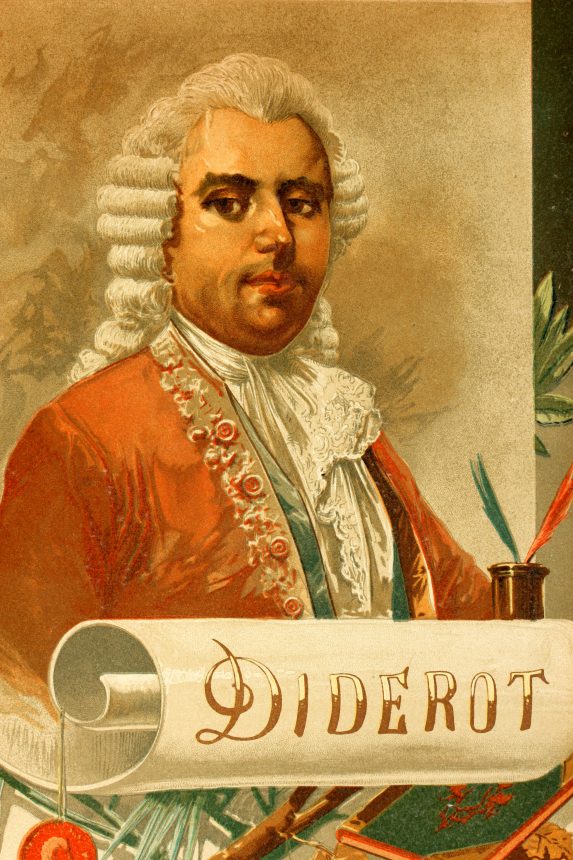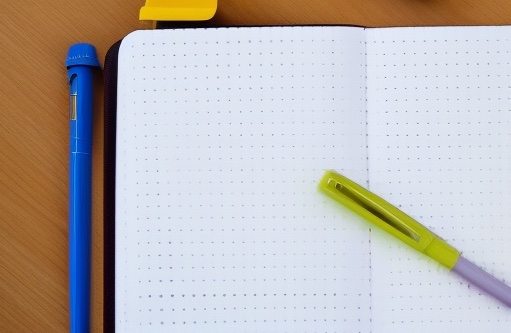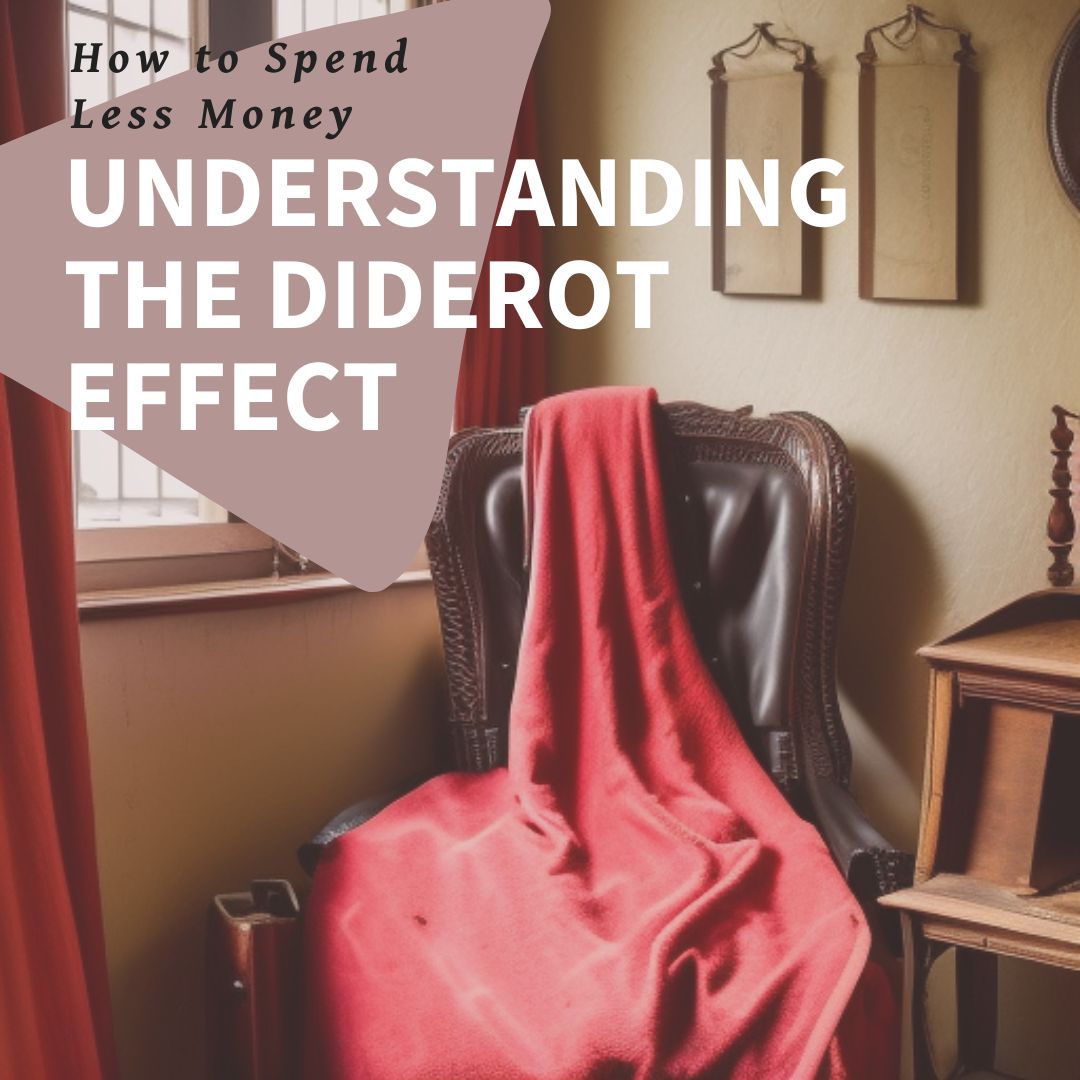Have you ever wondered, “Why do I spend so much money?!” The Diderot effect may hold the answer and the key to spending less.
What is the Diderot Effect?
The Diderot Effect is a phenomenon named after the French philosopher Denis Diderot, who experienced it in 1773. The essay “Regrets for My Old Dressing Gown” tells his story and explains the phenomenon.
The Diderot Effect refers to the tendency for people to buy a new item. This then leads to the desire to buy more complementary items to go with it. This can lead to a chain reaction of spending, as people continue to get new things to match their initial purchase.
For example, someone might buy a new outfit and then feel the need to buy new shoes, jewelry, and accessories to complete the look. A purchase can trigger a cycle of consumption and create a sense of dissatisfaction with one’s possessions.
The Diderot Effect is often viewed as a negative phenomenon, as it can contribute to overconsumption and materialism. Often this is the simple truth.
However, it can also be seen as a positive force, as it can drive innovation and creativity by inspiring people to seek out new products and ideas. Ultimately, the Diderot Effect highlights the identity and harmony.
Who was Diderot anyway?

Denis Diderot was a French philosopher, writer, and art critic who lived from 1713 to 1784. He was born in Langres, France, and received a classical education at the Jesuit College of Louis-le-Grand in Paris. As a young man, Diderot became interested in philosophy. He began to write about a wide range of subjects, including science, religion, and politics.
In 1745, Diderot was appointed chief editor of the Encyclopedie. Encyclopedie aimed to become a comprehensive reference work of the knowledge available at the time. The Encyclopedie was a massive undertaking. Diderot and his co-editor Jean le Rond d’Alembert worked on it for over 20 years.

The French government sought to censor Encyclopedie. In spite of this, Diderot and d’Alembert continued to publish. It eventually grew to 17 volumes and over 70,000 articles.
Diderot was also a committed advocate for civil liberties and was one of the first thinkers to call for the abolition of slavery. Diderot’s views helped shape the intellectual climate of 18th-century France. This led to a significant impact on the development of the Enlightenment.
In 1773, Catherine the Great, the empress of Russia, purchased the entire Encyclopedie from Diderot. Diderot was in financial distress at the time, trying to figure out how to pay for his daughter’s wedding. This was also the event that sparked a pattern of consumption that became known as Diderot effect.
Denis Diderot died in Paris on July 31, 1784, at the age of 70. He was a pioneering figure of the Enlightenment and students continue to study his works. Diderot made a lasting contribution to the world of knowledge and helped to shape the modern world as we know it.
How did The Diderot Effect come about?
Following the influx of cash coming from the sale of his library Diderot decided to treat himself. He upgraded his old robe, replacing it with a scarlet dressing gown. In his essay, “Regrets for My Old Dressing Gown” he outlines the result of this new purchase was that everything else in his house feel out of place.
He starts by replacing his straw chair with a leather one. Then upgrading his table, art, and hanging a new clock on the wall. All so that he can achieve harmony with his new robe. He writes, “I was the absolute master of my old robe. I have become the slave of the new one.”
Why do we buy things we don’t really need?
Some of it may come from our primal tendency towards competition with others. Whatever the reason for the initial purchase, once we buy one thing it is hard to stop the pattern of consumption if you don’t recognize what is happening.
I recently started bullet journaling. As part of that I needed to get a dot grid journal. Ok…”need” is maybe a bit strong but you get the point. When I started writing in my journal I noticed that my pen was bleeding through a bit. That led me to buy some new pens. I also wanted to add a splash of color here and there so I got some highlighters. And no journal is complete without perfectly straight lines so I got a 6” ruler. Then because I had the pens, the highlighter and the ruler, I got a pencil case to store my things.

All in, that example cost me less than $25 on Amazon, a relatively harmless spending spree. Yet, it illustrates just how quickly things can get away from us and spiral like they did for Diderot. I probably didn’t need the highlighters, or really the pens. The pen bleeding through the pages certainly didn’t impact readability. It was just a minor inconvenience. I didn’t need a splash of color and if the lines weren’t straight it wouldn’t affect the content. Outside of maybe the notebook, I likely didn’t need any of it.
This is how our houses, cars etc. fill up with things we don’t need. We buy things to fit our current state but soon that thing becomes out-dated, we upgrade, and now there are two of the same object. It’s possible your closet, like mine, is bursting with t-shirts that, once upon a time were worn as soon as they were washed. But as your style has changed that shirt is lucky to see the inside of the washing machine, let alone make it out of the closet!
That said, there are ways to help us stop spending money.
How can we combat The Diderot Effect?
There are many ways for us to combat this spiraling consumption. It doesn’t happen overnight but here are some tips for creating a process of improvement
Become aware of the Diderot Effect in your life and avoid unnecessary purchases
Next time you go to purchase something ask yourself if it is in response to an actual problem, or one created by another purchase. At least then you can make a more rational decision on whether or not to move forward with buying it. If you don’t need it, and purchasing it will only lead to more purchases, it’s better to cut down the tree at the roots than to work on trimming branches.
Analyze the total cost of purchases, not just the item you’re focusing on
You wouldn’t buy a house without factoring in closing costs, what your monthly payment will be, and your down payment. You shouldn’t be making a purchase without factoring in all the associated necessities.
Joshua Becker tells the story of his wife and daughter going to get a new backpack for school. They came home with a matching lunchbox, in spite of the fact that her old lunchbox was still serviceable. If you can’t afford the new backpack and the new lunchbox, it might be better to go without.
Get one Give one or sell one…maybe – avoiding the endowment effect
it can be helpful to adopt a practice of letting go of old possessions when you acquire new ones. This can help to break the cycle of overconsumption. You avoid becoming trapped in a pattern of seeking new things to replace the old.
When you get something new, consider whether there are any items you own that you can part with to make room for the new item. This could mean donating or selling items that you no longer use or need. One word of caution when deciding whether to donate or sell, avoid the endowment effect.
What is the Endowment Effect?
The endowment effect is a phenomenon in behavioral economics where people tend to place a higher value on an item they already own. This is true even compared to an identical item that they do not own. People overprice items they already own when selling because they have become attached to it. This is due to the psychological principle of loss aversion, which states that people are more motivated to avoid losses than to focus on gains.
Daniel Kahneman, Jack Knetsch, and Richard Thaler conducted one of the most influential studies in this area in 1990. Researchers gave participants a mug and offered the chance to trade it for different items of varying value, such as chocolate or a pen. Participants given the mug likely kept the mug when confronted with a potential loss (i.e., if they would have to give it up in exchange for another item). If given as a potential gain they were not (i.e., if they would receive it in exchange for another item). In short, they were overvaluing the mug if it was already theirs.
Understanding this, donating might be the better option. Selling can take time and parting with a product for less than the endowment effect makes you feel it is worth. If you decide to sell, ask yourself, “If I were going to buy this, used, from another person, what would I be willing to pay?”
Develop and stick to a budget
Imposing a personal budget should help us to keep track of our financial situation. Tracking creates a healthy financial structure to follow each month. Keeping this budget top-of-mind will increase the chance we stick to it and limit overspending.
An app like Mint or YNAB can help develop and maintain an effective budget. Create a schedule and build habits related to budgeting. You might start reviewing expenses every morning or evening. A weekly review also can help.
A podcast called minimal-ish gives great tips for starting and maintaining a budget. The episode from Jan 19, 2023, “Simplifying ‘Sticking to’ your Budget+ Tips for Your Grocery Budget Woes with Carly of Debt Free Mom” gives great insight.
Reduce your exposure to marketing messages
Marketers’ entire jobs are centered around getting you to buy new items. Reducing our exposure to tempting marketing campaigns can also help to reduce the effect of the downward spending spiral.
Try unsubscribing from retailer’s emails, have a break from social media scrolling and go for a walk in the park rather than a walk around the shops. Not only are these all healthy practices on their own but they will also help you create an environment where you are more satisfied with what you have.
Buy into the upcycling trend
Remember, you don’t always have to buy something new. Re-customising your current items gives inherent satisfaction. You might even enjoy it more than purchasing something else. You’ll get the opportunity to learn a new skill and end up with something completely unique. All this while not adding anything additional to the house.
Word to the wise – make sure the upcycling doesn’t trigger the Diderot effect. Make sure the item that your upcycling won’t need a complete overhaul of your possessions to keep up. Also be cognizant that supplies for upcycling don’t spiral out of control. The goal is decrease clutter not bring in a whole bunch of new tools, paints, and craft supplies!
Recognize there will always be upgrades to be had
There is a new iPhone coming out every single year. If you buy this year’s model, next year’s will be newer and so on. Letting go of the need to have the latest, trendiest, or best items will help in the journey to overcome the Diderot effect. After all the inverse of the Diderot effect is also true – The less you buy, the less you will want to buy.
The Diderot Effect is not a negative principle. Learn how to leverage it in a positive manner.
The idea of the Diderot effect doesn’t have to be an bad thing. There are many positive outcomes of the Diderot effect. It’s how we get the beautiful sleek look of Apple products that mesh seamlessly with one another in an ecosystem. It also explains why the owner of an Android phone will seldom be the owner of a macbook computer.

There is a reason we use the word, “aesthetic” compulsively these days. Our brains love harmony and creating it can create a sense of balance. If we are aware of the Diderot effect we can leverage it to create a positive environment without overspending.
You might want to upgrade your space. Recognize that any upgrade you purchase may feel out of place but that it can be assuaged through the removal of contradictory items. Also recognize that trends come and go. Trying to keep up with a trend will always have you playing catchup. Picking an evergreen aesthetic to center your life around makes it much easier to stretch satisfaction and harmony in your life.
As you focus on this harmony you’ll see more coordination and more unity in your life. As we are intentional with our possessions we can limit new purchases and make better use of our other possessions.
It’s not about having the best things, it’s about having the best things for you. The goal is not to increase consumption or decrease consumption, but to optimize consumption. Creating an environment where consumption can be intentional is the key to mastering the Diderot effect.
The Diderot Effect can encourages us to consider the role that consumer goods play in our lives. Recognition of the Diderot effect allows us to be more intentional consumers. Diderot said in his essay, “Poverty has its freedoms; opulence has its obstacles.” Although true in many settings, it doesn’t need to define our existence. Some luxury is not bad.
James Clear phrased it in an insightful way in his article on the Diderot Effect. “My goal is not to reduce life to the fewest amount of things, but to fill it with the optimal amount of things.” Finding that optimal level should be the goal.

